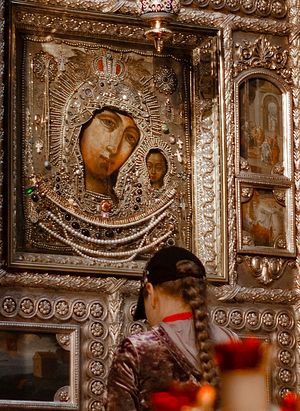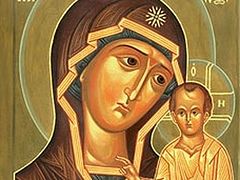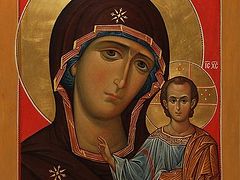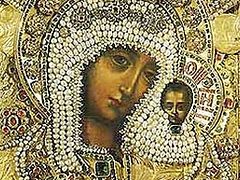In the name of the Father, the Son, and the Holy Spirit!
Beloved brothers and sisters, our ancestors, the Russian Orthodox people, had strong and deep faith in the heavenly mediation of the Mother of God, and often turned to her in their need, sorrow, and grief with warm and heartfelt prayer. Our people love to call the Mother of God by special names appropriate to her heavenly protection and mercy. And the Mother of God has not left this prayer unanswered, but has given speedy help to everyone who has asked. The history of the Russian nation is filled with testimony to these countless mercies of the Mother of God, which she showed to individual people and to the nation as a whole.
From the most ancient times, the Russian people have been distinguished by their simplicity, reverent faith, and sincere, heartfelt love for our Lord Jesus Christ. And in this simple but strong faith and sincere love lies the cause of the Mother of God’s special good will and mercy for the Russian Land. Although whole countries consider her to be their Protectress, in our fatherland the name of the Most Holy Mother of God has always been surrounded by the greatest honor. And in our fatherland she had poured out her mercy and grace in great abundance. Just look—in every large Russian city there is always a source of the Mother of God’s grace—her wonderworking icons. The most merciful Intercessor wanted to give people an as if heavenly promise of her love for them—her honorable icons. And there doesn’t seem to be a single corner of the Christian world where there isn’t a particularly revered icon of the Heavenly Queen. No icons of the saints have ever been so glorified by miracles as have those of the Mother of God.
Among the more revered and glorified of her icons is one called the Kazan icon, in honor of which a true festival has been established. Most of you probably know the history of this miracle-working icon, but in case someone doesn’t I will briefly relate the story of its miraculous appearance.
During the second half of the sixteenth century, a large region of Kazan Tartaria became part of Russia. Along with this, the Christian faith began to be spread there; however Mohammedanism stubbornly warred with Orthodoxy. If at first the preaching of the Gospel was very successful, later due to the lack of preachers who were strong in spirit and in word, the proclaiming of Christianity in the newly annexed region began to noticeably weaken. To make matters worse, in 1579 Kazan suffered from a fire, and this circumstance served as a weapon for the unbelieving to use in their attack against Christians—they pointed to the fire as a sign of God’s anger against them. And in order to strengthen the faith of wavering Orthodox Christians and to console them, the Lord manifested His love for them, as the chronicler expressed it, “from the same placed that He had sent His righteous wrath upon them for their sins.”
Not far from the place where the fire had started stood the house of one rifleman, which had burned down together with the others. Thus, to the daughter of this rifleman, nine-year-old Matrona, the Mother of God appeared in a dream and said that on the very ashes of her house, in the earth, is her icon, and she commanded her to tell the archbishop about it. The girl told her mother about the wondrous dream, but the latter did not pay any attention to her story. Then the Mother of God appeared a second time to Matrona and told her the same thing again. And again her mother did not consider her daughter’s dream of any portent. Finally, the vision happened a third time. The girl saw the icon of the Mother of God, exuding fiery rays. At the same time a threatening voice was heard saying, “If you do not relate my words, I will appear in another place, but you will perish.”
Waking up from this terrifying vision, Matrona called to her mother with a loud voice and begged her to go quickly to the archbishop. This time the mother obeyed her daughter. They went together to the military leaders and Archbishop Jeremiah, but no one believed the girl’s words. Then her mother began digging the earth on the spot shown by the Queen of Heaven. Other people joined her, but no matter how much they dug they could not find an icon. Then the girl Matrona took the shovel in her hands, and when she began digging she discovered a precious icon, from which a wondrous light shone. News of this amazing appearance spread rapidly throughout the city, and all the inhabitants gathered and prayed to the Most Holy Mother of God with tears of compunction, “O Sovereign Lady, save us!”
From the very moment of its appearance the icon began manifesting in obvious ways its miraculous power. When it was brought to the town’s cathedral, a man named Joseph, who had been blind for three years, was healed. In the cathedral another blind man named Nikita received his sight, and from that time on miracles flowed from the icon, especially for those who suffered from illnesses of the eyes. But the Kazan icon of the Mother of God was glorified most of all during the invasion of our fatherland by the Poles in 1612, when the Russian Land was saved by the intercession of the Queen of Heaven.
In remembering the history of today’s feast, our attention is drawn to the circumstance that the Mother of God appeared to none other than an innocent and pure of soul, nine-year-old maiden, who was worthy to dig up with her own hands the miracle-working icon that had been shown to her. This leads us to the conclusion that only those who are pure of soul are close to divine holy things, and that the Mother of God is especially well inclined toward pure souls. The Lord also said through the prophet Isaiah, Wash you, make you clean; put away the evil of your doings from before mine eyes (Is. 1:16). It is clear what the Lord demands through His prophet. He commands each of us to wash the defilement from our hearts and acquire purity of soul. But is there really any impurity in our souls? Does sinful defilement really have a place in our hearts? Yes, they do. Every sin has its beginning in our soul, and every iniquity proceeds from our hearts. Every imagination of the thoughts of his [man’s] heart was only evil continually (Gen. 6:5). From within, from the heart of man proceed evil thoughts (Matt. 15:19).
That is why the apostle Paul said, Let us cleanse ourselves from all filthiness, not only of the flesh but also of the spirit (2 Cor. 7:1). What is this impurity of soul and what is this filthiness of sin in our hearts? Impurity of soul and filthiness of heart are bad thoughts that are displeasing to God. The thoughts of the wicked are an abomination to the Lord (Prov. 15:26), says the wise Solomon. Impurity of soul and defilement of heart are greedy desires and pleasure-loving lusts. Therefore God in His Law commands us not to desire our neighbor’s wife, or his house, or his field, or his servants, nor his ox or ass, or any thing that is thy neighbour’s (Deut. 5:21). And the holy Church teaches us to pray, “Jesus, preserve my heart from evil lusts.”
Impurity of soul and filthiness of heart are the extraneous cares of life, which the Savior commands us to avoid. Take no thought for your life, what ye shall eat, or what ye shall drink… For after all these things do the Gentiles seek (Matt. 6:25, 32).
Impurity of soul and filthiness of heart are the secret, usually unnoticed by us, sin-loving thoughts and desires. As for transgressions, who will understand them? From my secret sins cleanse me… If they have not dominion over me, then blameless shall I be, and I shall be cleansed from great sin (Ps. 18:13–14).
Impurity of soul and filthiness of heart are vain, worldly thoughts. Therefore we pray to the Lord, “Jesus, cleanse my mind from vain thoughts.” With such impurity of soul a person remains a sinner, although he may never have committed any obvious crimes and sins, and although his outward life many be spotless. Such were the Pharisees, whom the Lord rebuked, saying, Even so ye also outwardly appear righteous unto men, but within ye are full of hypocrisy and iniquity (Matt. 23:28). For God does not look at the face but tests the heart and inward parts. Therefore we should take all measures to escape all charms and temptations, from which impure thoughts and desires are born in the soul and arouse passions. Therefore, if temptations are so destructive, then we must turn away our eyes, that they may not see vanity (Ps. 118:37), and guard our senses, in order to deflect all the infections and snares of the evil one.
The Most Holy Mother of God, as we have said, is especially well inclined toward spotless souls, being herself brighter than the sun. Pure souls make her glad, and therefore we must take all pains to cleanse our souls from every sinful defilement and strengthen the virtues that are opposite to the passions. After all, the Lord also rejoices at a pure heart, and for the most part vouchsafes only the pure of heart to see Him: Blessed are the pure in heart, for they shall see God (Matt. 5:8). But if charms and vanity, or proud, vainglorious thoughts, or greedy desires, or pleasure-loving lusts have already stolen into your soul, then you must quickly oppose them, crush and kill them with healthy discernment and heartfelt prayer to our Lord Jesus Christ and to the Most Pure Virgin Mary. But if it happens that you are unable to withstand seduction and have a fall, if your soul is darkened by the filthiness of sin, then you must wash away your defilement and cleanse your soul with tears of repentance. And your tears should be united with warm prayer. Amen.
From Archimandrite Kirill (Pavlov) In Praise of the Mother of God (in Russian)
1960




